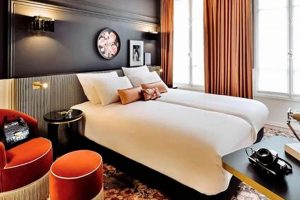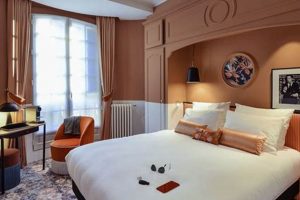The subject of this article denotes a specific lodging establishment situated in a prominent area of the French capital. This locale is near a major transportation hub and in proximity to a historically significant district. The phrasing identifies a particular branch of a well-known international hotel chain, its location defined by key Parisian landmarks.
Its significance stems from providing accommodation options for travelers utilizing the Gare de Lyon, a major railway station facilitating both domestic and international travel. Furthermore, its location near the Bastille offers guests convenient access to historical sites and cultural attractions. This positioning benefits visitors seeking both ease of transportation and immersion in Parisian history and culture.
The subsequent sections will delve into aspects such as amenities, accessibility, and potential nearby attractions, providing a detailed overview for prospective guests and those interested in the area’s logistical advantages.
This section offers guidance for maximizing the experience of lodging in the vicinity of the Gare de Lyon and Bastille areas. These suggestions aim to enhance convenience and ensure a fulfilling visit.
Tip 1: Utilize Public Transportation. The Gare de Lyon is a central transportation hub. Familiarize yourself with the Metro and RER lines to efficiently navigate Paris and its surrounding areas. Purchase a Navigo Dcouverte pass for cost-effective travel.
Tip 2: Explore the Bastille District. Investigate the historical significance of the Bastille. Visit the Place de la Bastille, the site of the former prison, and explore the surrounding streets for restaurants and shops.
Tip 3: Plan for Gare de Lyon Transfers. If connecting through the Gare de Lyon, allow ample time for transfers, particularly between SNCF and RER lines. The station can be crowded, especially during peak hours.
Tip 4: Consider River Cruises. Several Bateaux Mouches operators offer river cruises departing near the Bastille. This provides a unique perspective of Paris’s landmarks and is a relaxing way to see the city.
Tip 5: Explore Local Markets. Numerous markets operate in the vicinity. Investigate local market schedules to experience authentic Parisian culture and purchase fresh produce and regional specialties.
Tip 6: Pre-book Accommodations. Due to the area’s popularity, securing lodging in advance is advisable, especially during peak tourist seasons. This ensures availability and potentially allows for better rates.
Tip 7: Learn Basic French Phrases. While many Parisians speak English, attempting basic French phrases is appreciated and can enhance interactions with locals. Simple greetings and requests will be helpful.
These suggestions aim to optimize the experience of staying near the Gare de Lyon and Bastille, ensuring efficient travel, cultural immersion, and a memorable visit.
The following sections will provide an overview of potential dining options and recreational activities in the vicinity.
1. Strategic Location
The positioning of a lodging establishment, especially in a metropolitan area like Paris, significantly influences accessibility, convenience, and overall guest experience. In the context of a hotel near the Gare de Lyon and Bastille, “Strategic Location” becomes a critical determinant of its value proposition.
- Gare de Lyon Proximity
Direct adjacency to the Gare de Lyon offers immediate access for travelers arriving by train. This eliminates the need for lengthy transfers and reduces travel fatigue. For instance, individuals traveling from other European cities via high-speed rail can disembark and quickly reach their accommodations, facilitating efficient travel schedules. The proximity is particularly advantageous for early morning or late-night arrivals and departures.
- Bastille District Accessibility
Location near the Bastille district provides access to a historically significant area with cultural and recreational opportunities. Guests can explore the Place de la Bastille, visit local restaurants, and experience Parisian nightlife without extensive travel. This accessibility enhances the guest’s ability to immerse themselves in the city’s culture and history during their stay.
- Public Transportation Connectivity
A strategic location ensures connectivity to Paris’s extensive public transportation network, including the Metro and bus lines. This allows guests to easily reach other parts of the city, such as the Louvre, Eiffel Tower, or Montmartre. Efficient public transport access minimizes reliance on taxis or ride-sharing services, reducing travel costs and optimizing travel time.
- Surrounding Amenities
The presence of essential amenities in the immediate vicinity, such as restaurants, cafes, shops, and pharmacies, contributes to the strategic value of the location. Guests benefit from the convenience of having these resources readily available, catering to their immediate needs and enhancing their overall comfort. A variety of dining and shopping options within walking distance increases the attractiveness of the location.
The aforementioned facets highlight how a strategic location, specifically concerning proximity to the Gare de Lyon, accessibility to the Bastille district, connectivity to public transport, and the availability of surrounding amenities, collectively enhances the overall value and convenience associated with lodging in this particular area of Paris.
2. Transportation Hub Access
The proximity of the hotel to a major transportation hub like Gare de Lyon directly impacts its accessibility and appeal. The Gare de Lyon serves as a primary node for both domestic and international train travel, including high-speed rail connections. This positioning reduces transit time for travelers arriving or departing by train. For example, business travelers attending conferences in Paris can efficiently travel from Lyon or Marseille and immediately access their lodging, optimizing their schedule. Similarly, tourists arriving from other European cities experience minimized travel fatigue due to immediate access to accommodation after disembarking.
Furthermore, Transportation Hub Access extends beyond rail travel. The Gare de Lyon provides connectivity to the Parisian Metro and bus network. This integrated access facilitates travel to various points of interest throughout Paris, encompassing historical sites, museums, and commercial districts. Guests can utilize public transportation to reach the Eiffel Tower, the Louvre, or the Champs-lyses without incurring significant travel time or expense. The hotel’s strategic location therefore streamlines the exploration of the city. Conversely, individuals with early morning train departures benefit from the ease of reaching the station, mitigating the risk of delays and ensuring punctual travel.
In conclusion, the Transportation Hub Access characteristic of lodgings near the Gare de Lyon is a significant determinant of their value. It contributes to convenience, efficiency, and cost-effectiveness for both business and leisure travelers. Any potential challenges relating to increased foot traffic or noise levels in the area are often outweighed by the practical benefits of immediate access to major transportation networks, thereby solidifying its importance as a component of the hotel’s location-based advantages.
3. Historical Proximity
The location of this particular lodging near the Bastille is not merely geographical; it represents a connection to a significant historical narrative. The proximity allows guests to engage with the historical context of Paris, fostering an understanding of the city’s evolution.
- Proximity to the Place de la Bastille
The Place de la Bastille, a short distance from the lodging, marks the site of the former Bastille prison, a symbol of the French Revolution. Guests can visit the square, reflect on its historical significance, and connect with a pivotal moment in French history. The July Column, erected in memory of the July Revolution of 1830, stands as a visible reminder of past events. The presence of historical markers and interpretive displays provides context for understanding the square’s role in shaping modern France.
- Influence of the Marais District
While not directly adjacent, the Marais district, known for its preserved architecture and historical significance, is accessible from this location. The Marais offers a glimpse into pre-revolutionary Paris, showcasing buildings and cultural institutions that survived the tumultuous period. Exploring the Marais allows visitors to contrast the district’s preserved history with the revolutionary associations of the Bastille area, providing a balanced perspective on Parisian history.
- Impact on Cultural Experiences
Historical proximity influences the cultural experiences available to guests. The location allows for convenient access to historical tours focusing on the French Revolution and its aftermath. Local museums and galleries often feature exhibitions related to Parisian history, providing opportunities for deeper engagement with the city’s cultural heritage. Restaurants in the vicinity may offer traditional French cuisine, reflecting culinary traditions shaped by historical events.
- The Faubourg Saint-Antoine Influence
The hotel’s location lies near the Faubourg Saint-Antoine, historically a working-class district and a hotbed of revolutionary activity. This proximity provides a context for understanding the social and economic forces that fueled the French Revolution. Exploring the streets of the Faubourg Saint-Antoine allows visitors to connect with the lives of ordinary Parisians who played a crucial role in shaping the city’s history and political landscape.
The historical proximity of the lodging offers guests more than just a place to stay; it provides an opportunity to engage with Parisian history in a tangible way. The connection to the Bastille, the influence of the Marais, the impact on cultural experiences, and the proximity to the Faubourg Saint-Antoine collectively enhance the guest’s understanding and appreciation of Paris’s historical depth, enriching their travel experience.
4. Accommodation Standard
The accommodation standard of a lodging establishment fundamentally defines the guest experience. In the case of a specific branded lodging in Paris, the term directly correlates with the expected level of service, amenities, and overall quality associated with that brand. “Accommodation Standard” isn’t merely a descriptor; it’s a promise, and the degree to which a given property fulfills that promise dictates its success and customer satisfaction. The branded lodging, therefore, must meet the minimum expectations of the brand in areas such as room size, cleanliness, and available facilities to maintain consistency and consumer confidence. Consider a traveler who chooses the lodging because of their familiarity with the brand and its purported standards. If the property fails to meet those standardsfor example, rooms are smaller than expected, or amenities are missingthe traveler’s perception of the brand as a whole is negatively affected. This highlights the symbiotic relationship between the brand and its individual locations, where the accommodation standard acts as a crucial link.
Furthermore, the “Accommodation Standard” encompasses factors such as the quality of bedding, the functionality of in-room technology, and the responsiveness of staff. The brand likely has established protocols for maintaining these aspects, which are internally monitored and regularly assessed. These procedures are in place to ensure that the guest experience is reasonably consistent across all of the lodging brand locations. For instance, if the “Accommodation Standard” includes complimentary high-speed internet, the property must ensure that the service is consistently available and reliable. Deviation from these established benchmarks, regardless of the specific geographical location, reflects negatively on the brand and its ability to deliver on its promise. The “Accommodation Standard” serves, in effect, as a guarantee to the consumer that their expectations will be met. Failure to uphold that guarantee leads to customer dissatisfaction and potential damage to the brand’s reputation.
In summary, the accommodation standard is not merely a feature of a hotel but is integral to its identity and value proposition. It represents a binding agreement between the brand and its customers, predicated on the consistent delivery of specified levels of comfort, service, and amenities. Inconsistent execution can have severe consequences for brand reputation, underscoring the critical importance of upholding the “Accommodation Standard” at all locations. Challenges may arise in maintaining consistency across diverse geographical locations and cultural contexts, requiring effective management strategies and robust quality control measures.
5. International Brand Reputation
An international brand reputation significantly influences consumer choice, particularly in the hospitality sector. The strength of this reputation creates expectations regarding service, quality, and reliability, affecting the perceived value of individual locations, such as a lodging near Gare de Lyon and Bastille.
- Brand Recognition and Trust
Brand recognition provides immediate familiarity and trust. A well-established international brand benefits from pre-existing customer awareness. For example, travelers familiar with a specific lodging chain may select it due to positive past experiences, regardless of the specific location. This built-in trust can be particularly valuable in unfamiliar travel environments. The presence of a recognized brand reassures potential guests regarding the quality and safety of their stay.
- Standardized Service Expectations
International brands typically implement standardized service protocols. These protocols aim to ensure a consistent guest experience across all locations. Guests expect a specific level of cleanliness, amenities, and customer service, regardless of whether they are staying in Paris, New York, or Tokyo. This consistency is a major driver of brand loyalty, as it provides travelers with predictable and reliable service. The standardized approach reduces the risk of encountering unexpected problems or substandard conditions.
- Global Loyalty Programs
Many international hotel brands operate global loyalty programs. These programs offer rewards and benefits to frequent guests, incentivizing them to choose properties within the brand network. Loyalty program members may receive perks such as free upgrades, discounted rates, and priority check-in. The benefits of these programs influence booking decisions, as travelers seek to maximize their rewards and leverage their loyalty status. The presence of a robust loyalty program enhances the perceived value of choosing a specific lodging within the network.
- Marketing and Global Reach
International brands possess extensive marketing resources and a global reach. Their marketing campaigns raise brand awareness and drive bookings. The brands use diverse channels, including online advertising, social media, and public relations, to reach potential customers worldwide. This global visibility translates to increased brand recognition and demand, particularly in popular tourist destinations like Paris. The effective marketing strategies contribute to the occupancy rates and revenue performance of individual properties within the brand network.
These facets illustrate the interconnectedness of international brand reputation and the success of individual lodging locations. The brand name establishes a foundation of trust and expectation, influencing consumer choice and contributing to occupancy rates and revenue. Potential challenges involving localized customization and maintaining consistent quality necessitate strategic management to leverage the advantages of a strong brand while adapting to local market needs.
Frequently Asked Questions
The following section addresses common inquiries regarding accommodations near the Gare de Lyon and Bastille area in Paris. This information aims to provide clarity and assist in informed decision-making.
Question 1: What are the primary transportation options available from this location?
The proximity to the Gare de Lyon facilitates access to SNCF national and international train lines, as well as the RER A and D lines. Multiple Metro lines are also accessible, providing comprehensive connectivity to Paris and its environs. Several bus routes operate in the immediate vicinity.
Question 2: What types of dining establishments are located nearby?
The area offers a diverse range of dining options, including traditional French bistros, international cuisine restaurants, cafes, and bakeries. Options cater to varied budgets and culinary preferences.
Question 3: What are the key historical sites accessible from this lodging?
The Place de la Bastille is within walking distance, serving as a landmark of the French Revolution. The Marais district, with its preserved architecture and historical sites, is also easily accessible by public transport.
Question 4: Does the lodging provide accessibility features for individuals with disabilities?
Potential guests should consult the lodging’s official website or contact its customer service department directly to inquire about specific accessibility features, including wheelchair access, adapted rooms, and assistive devices.
Question 5: What amenities are typically included in a standard room?
Standard amenities generally encompass a private bathroom, television, Wi-Fi access, and air conditioning. Additional amenities may vary; consulting the official website is recommended for detailed information.
Question 6: How far in advance should reservations be made?
Advance reservations are advisable, particularly during peak tourist seasons and major events, to ensure availability and potentially secure more favorable rates. Booking several weeks or months in advance is recommended.
This FAQ section provides foundational information. For specific inquiries, direct communication with the lodging establishment is encouraged.
The succeeding section will explore considerations related to pricing and value assessments.
“Holiday Inn Paris Gare de Lyon Bastille Paris France”
This exposition has elucidated several facets of the establishment designated as “Holiday Inn Paris Gare de Lyon Bastille Paris France.” The analysis encompassed its strategic geographical positioning, the inherent advantages of transportation hub access, the historical significance of its surroundings, the implications of its accommodation standards, and the impact of its international brand affiliation. Each element contributes to the overall value proposition presented to potential guests.
The confluence of these attributes location, accessibility, established brand, and predictable standards defines the property’s competitive advantage within the Parisian hospitality landscape. Ongoing evaluation of service delivery and adaptation to evolving traveler expectations are critical for sustaining its position and maximizing its long-term viability within the dynamic market. Understanding and responding to these factors is essential for informed decision-making by stakeholders.







